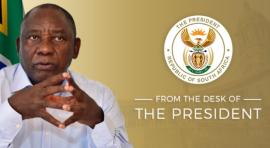
President Cyril Ramaphosa has reiterated South Africa’s commitment to a diplomatic solution that ensures stability in the Democratic Republic of Congo (DRC) and its neighbours, while also protecting the well-being of the Congolese people.
In his weekly newsletter to the nation, President Ramaphosa said South Africa supports the right of the Congolese people to live free from forces that violate their human rights, plunder their natural resources and terrorise their communities.
“South Africa stands in solidarity with the Congolese people and their aspiration to live in peace and security.
“We reaffirm our commitment to a diplomatic and political solution that prioritises the stability of the DRC and neighbouring countries and safeguards the peace and well-being of the Congolese people,” the President said on Monday.
This as the President has just returned from a Heads of State summit in Tanzania on the conflict in the eastern DRC.
He said the outcomes of the summit provide a beacon of hope for the troubled eastern Democratic Republic of Congo.
Heads of State and Government from the Southern Africa Development Community (SADC) and East Africa Community (EAC) have issued a clarion call for “political and diplomatic engagement” by all parties, including M23 rebels, in the eastern DRC.
Leaders from the two regional blocs, including President Ramaphosa, attended an urgent joint SADC-EAC Heads of State and Government Summit at the weekend as tensions, and casualties, in the DRC conflict continue to escalate.
The historic joint summit brought together the EAC and SADC to consider the deteriorating security situation in the eastern DRC and to find a sustainable political solution.
As a member of SADC and the African Union, the President said the country has a responsibility to support all efforts to bring peace and stability to its fellow African nation, which has been racked by war for more than three decades.
Loss of lives
South Africa contributes troops to the United Nations Organisation Stabilisation Mission in the DRC (MONUSCO) and the SADC Mission in the DRC (SAMIDRC).
Recently, 14 South African National Defence Force (SANDF) troops paid the ultimate price for their efforts to restore peace to the region. The deaths of the soldiers alongside troops from other African nations signalled an alarming escalation in the conflict.
READ | Movement of fallen SANDF soldiers now underway
The strategic city of Goma in the eastern DRC is now under the control of the M23 rebel group fighting the Congolese army, with the M23 having made advances in other towns.
Diplomacy
“As South Africa we have steadfastly maintained that diplomacy is the most sustainable solution to this conflict. While we are involved in peacekeeping missions, South Africa actively participates in the various diplomatic efforts to end the conflict in the eastern DRC,” he said.
These include the Peace, Security and Cooperation Framework for the DRC and the Great Lakes Region, the Luanda Peace Process led by the President of Angola, João Manuel Gonçalves Lourenço , and the EAC-led Nairobi Process facilitated by former Kenyan President Uhuru Kenyatta.
“As South Africa, we have always believed that the best way to resolve a conflict is to ensure that all parties to the conflict are involved in the negotiations that lead to the resolution of the conflict, whether they are state actors or non-state actors.
“We are pleased that this approach was adopted and reconfirmed at the SADC extraordinary summit held in Harare, Zimbabwe, two weeks ago,” the President said.
He highlighted that several of the countries in the EAC bloc, such as Uganda, Burundi, Tanzania and Rwanda, share borders with the DRC and are directly impacted by the ongoing conflict. It was therefore significant that the Heads of State of these countries and the President of the DRC were at the joint summit.
Way forward
“Having considered a report on the security situation in the eastern DRC, the summit reiterated the call for an immediate ceasefire and a cessation of hostilities between the warring parties. A ceasefire will allow humanitarian aid corridors to operate and bring much needed supplies to the civilians caught in the crossfire,” he said.
The summit further directed that the EAC/SADC Chiefs of Defence Forces meet within five days to develop a securitisation plan for Goma and the surrounding area, the reopening of Goma airport, the evacuation of civilians and the repatriation of the deceased.
READ | SADC-EAC leaders call for dialogue in DRC conflict
One of the most significant outcomes was that the joint summit agreed that direct negotiations and dialogue resume between all state and non-state parties, including the M23. This will take place under the framework of the Luanda and Nairobi processes.
“We are pleased that this inclusive approach was endorsed and adopted at the historic joint EAC/SADC summit under the leadership of President William Ruto of Kenya and President Emmerson Mnangagwa of Zimbabwe.
“This is a major step forward. Unless all parties to the conflict are brought around the negotiating table, all diplomatic solutions will lack credibility and be unsustainable in the long term,” President Ramaphosa said.
The joint summit also affirmed the independence, sovereignty and territorial integrity of the DRC, meaning that a process must be developed for uninvited foreign armed forces to withdraw from the DRC.
President Ramaphosa said the outcomes from the joint summit are in essence confidence-building measures towards a sustainable peace.
“These confidence building measures will finally lead to the drawdown of the SAMIDRC troops. This historic summit of the EAC and SADC paves the way for a lasting peace in the eastern DRC.”
The President concluded by quoting Congolese revolutionary and statesman, Patrice Lumumba, who once said: “We are not alone. Africa, the free peoples and the peoples fighting for their freedom in all corners of the world will always be side by side with the millions of Congolese who will not give up the struggle.” – SAnews.gov.za


